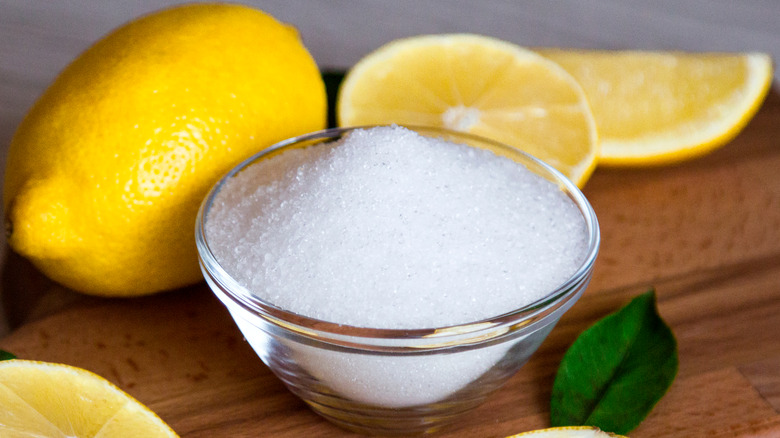Is Citric Acid Bad For You?
Citric acid is a weak organic acid used as a natural preservative found largely in lemons, limes, and other citrus fruits like grapefruit and oranges. It was first made from crystallized lemon juice in 1784 by a Swedish chemist named Carl Wilhelm Scheele (via BMC Chemistry). Citric acid has become a "widely used preservative in the food and beverage industry," according to "Comprehensive Membrane Science and Engineering" (via ScienceDirect).
Additives and preservatives in our food get a bad rap — but are they all actually bad for you? According to the World Health Organization, there are several thousand food additives used worldwide, for purposes of making food products safer, more appealing, and more convenient. While the natural form of citric acid is found in many citrus fruits, a manufactured form is used in many different products and grown from black mold (via Prevention). Because this differs from the naturally derived form, many people worry that it's dangerous and should be avoided. But is that true?
Citric acid is safe in moderation
Citric acid as a preservative is found in everything from hummus to soda to many jarred and canned foods (via Prevention). And it's not just in food products — it can even be found in some cosmetics, cleaning agents, and medicines. Although the American Academy of Allergy, Asthma, and Immunology assures us that the black mold is filtered from the manufactured product leaving no trace of it (via Prevention). Additionally, the amount of citric acid used as a preservative is insignificant. Scientists agree that at this low amount, citric acid isn't an additive to be worried about. And according to a study in the Journal of Medicinal Food, it has even proved to be beneficial.
The study showed that citric acid in low doses is proven to help with chronic inflammation and brain oxidative stress, an imbalance that can lead to cell and tissue damage. It was also shown to aid in mineral absorption, particularly that of calcium and phosphorous. And according to the University of Wisconsin-Madison Hospital Metabolic Stone Clinic, citric acid can even be beneficial in protecting against kidney stones.
That being said, everything should be consumed in moderation. People with sensitivities or allergies may be triggered by the possibility of mold residue, and consuming too much citric acid can lead to tooth erosion (via Prevention). But in general, this common food preservative is nothing to be feared, so you can continue to snack on your chips and salsa in peace.


